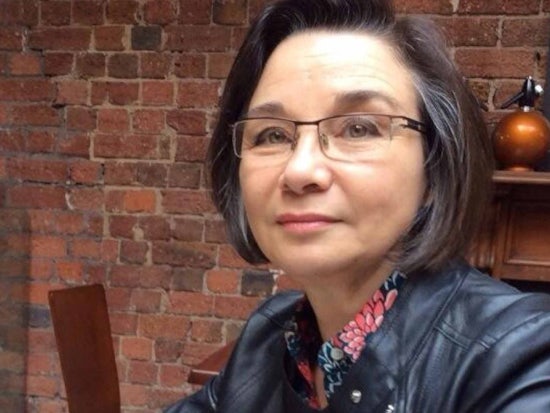“Dementia is a gift”
Author, advocate, activist, poet, mother, wife, student, retired chef, retired nurse, animal lover are the words Kate Swaffer uses to describe herself on her Facebook page. If it wasn’t for her advocacy work, you’d never know Ms Swaffer was diagnosed with younger onset dementia at the age of 49.

Kate Swaffer was diagnosed with younger onset dementia at the age of 49
As a nurse who had worked in aged/dementia care, a person who cared for three people with dementia, and having been diagnosed with other life threatening illnesses and now dementia, Ms Swaffer is in a very unique position. She has experienced ‘care’ from many different angles and she believes much needs to be done to change attitudes and the care for those living with dementia.
If she’d have followed the advice given to her when she was first diagnosed with dementia, Ms Swaffer would probably have a very different story to tell.
“Health care professionals and service providers all told me the same thing; to give up work, give up study and go home and live for the time I had left. On the way, it was also suggested I put my end-of-life affairs in order – even though at no time was I told dementia is a terminal illness – and to get acquainted with aged care, including selecting a respite day care and residential care facility, sooner rather than later, so I could become used to it. My husband was told he would soon have to give up work to become a full-time carer,” she says.
The reality of this treatment is, says Ms Swaffer, it takes away all hope of any sense of the future. She points out it turns her into a victim, tells carers to take over and further disable her, and in doing so, it turns them into martyrs.
Ms Swaffer compares the treatment of dementia diagnosis to where cancer was 40 years ago.
Now we’re diagnosing people earlier, with five, ten or maybe 20 years left to live, but we’re still treating people as if it’s late stage diagnosis, she says.
She’s coined (and trademarked) the phrase ‘Prescribed Disengagement®’. “It’s learned helplessness – it disables and disempowers us to live beyond dementia and to continue being active and healthy,” Ms Swaffer explains. “If you have a brain injury you’ll have a type of rehabilitation –why can’t the same be done for people living with dementia?”
She points out while the world has been pushing hard for earlier diagnosis, post diagnosis support has not caught up; she believes it needs to change away from late stage support, to one of proactive support. “This includes disability support and rehabilitation for us to remain as independent and active as possible,” she says.
Ms Swaffer admits she found using some aids initially difficult. “I didn’t like the Webster pack and didn’t like the idea of a walking stick,” she says. But then she viewed them differently. “If someone has lost a leg, they have a prosthesis fitted – my aids are so I can live in my house for longer.”
And we don’t see what goes on behind the scenes; laminated cards to remind her how to make a cup of coffee, a shared family calendar, phone calls from her BUB (Back up Brain – otherwise known as her husband Peter) to remind her to eat.

She also believes if people were treated differently, behaviours would change. Current thinking is 90% of people with dementia experience behavioural and psychological symptoms of dementia (BPSD). Ms Swaffer believes, and indeed a growing community of clinicians and researchers now also believe, this is probably not the case, but rather only 10% of changed behaviours are due to the dementia itself, and the rest are in response to the way people are cared for or spoken to.
This leads to her other strong advocacy against the negative language used in the media, the dementia service provision sector and academia to describe people’s experiences of living with dementia. If the care provided is to change, Ms Swaffer believes words such as dementia sufferer, demented or victim shouldn’t be used.
Through Dementia Alliance International (DAI), of which she is a founding member, Ms Swaffer is providing online support internationally, working towards helping groups in countries such as Nigeria, Iran, Japan, Spain, Italy, Indonesia, New Zealand and Taiwan. The human rights of people with dementia lie at the heart of DAI’s work. “Australia is still locking many people up with dementia,” she says. “This is unlawful detention – we’re ten years behind some countries in this area.”
In the UK, studies show dementia has now beaten cancer for the top spot in the list of most feared disease by people aged 40 and above. Ms Swaffer believes the world cannot afford economically to keep doing what it has always done.
“The Government can’t afford to do what it’s doing; we need to upskill nurses and look at changing practice – it will be less expensive to use non-pharmaceutical methods in the long run,” she says. “There are now far too many examples of people like me, diagnosed early in the disease process, who have gone on to live very productive lives, in spite of dementia.”
In amongst her advocacy work which involves talking at conferences and writing for many publications including the Huffington Post, Ms Swaffer is currently studying a PhD. “I’m using autoethnography (a form of qualitative research) to explore the lived experience of dementia, with a focus on why this type of methodology is useful for analysing our experience,” she says. “It is also looking at whose story it is to tell, as predominantly our stories have been spoken or written about by people without dementia, which I feel is inappropriate, as it is our, not their story to tell.”
Ms Swaffer is also exploring stigma, particular the notion of passive stigma in the sector.
Changing thinking and ideas has been met with some opposition, with some professionals accusing her of lying about her dementia diagnosis.
This also happens to many others with dementia; it seems ok to do well with cancer, but not with dementia, she notes.
The advocacy journey is one Ms Swaffer says she fell into. She’d not long been diagnosed with dementia when she was given the assignment about a journey for a travel writing course she was doing. “I couldn’t get dementia out of my head – it was alike a place I was visiting,” she says. “I asked the lecturor if I could write about that. He said yes.” A colleague who worked in the media read the assignment, published it and it has continued from there.
Ms Swaffer sees her dementia as a gift. She says it has taught her to be grateful for what she has and for those who have stuck by her. “I’ve started writing poetry which I’d never done.
“But seriously, being told you have a terminal illness with a finite time to live, does give you a new perspective on life, and if there are things you want to do like travel, or spend time with family or friends, or things you feel you must do before you die, as is the case in my dementia advocacy, then it is imperative we all make the most of every single day,” she adds. “ After all, we are all born with a death sentence.”
She’s also written the book What the hell happened to my brain? and her second book, Alzheimer’s or another Dementia: a practical guide to what’s next for people living with dementia, their families and care partners, written in partnership with Lee-Fay Low and is out soon.
Ms Swaffer is also speaking this Thursday at BaptistCare’s ‘The Stories of Me – a dementia forum connecting experience and theory’ in Sydney.











![The new Aged Care Act exposure draft is slated for release in December of 2023, but advocates hope to see it rolled out on January 1, 2024. [Source: Shutterstock]](https://agedcareguide-assets.imgix.net/news/articles/wp/agedcareact__0811.jpg?fm=pjpg&w=520&format=auto&q=65)












Comments